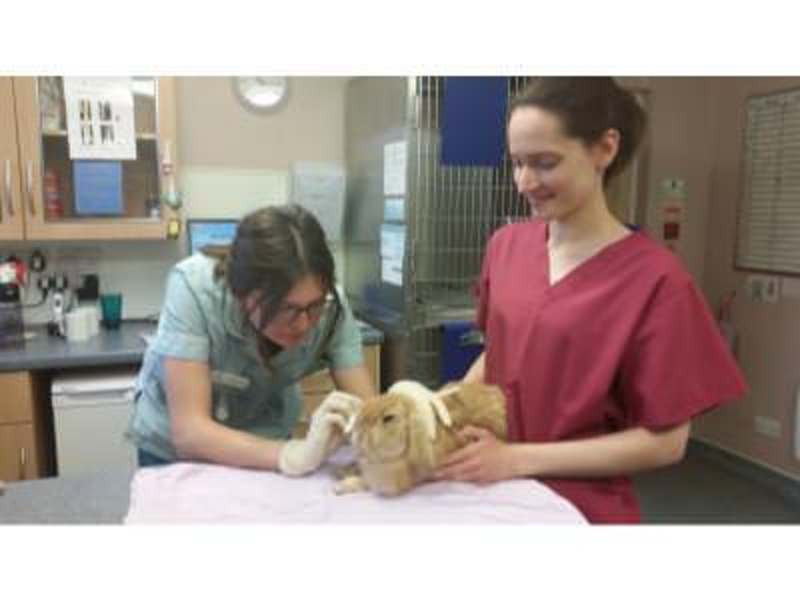Did you know over 57% of rabbits live alone? Many rabbit owners don't know that like us rabbits are social animals and need a bunny friend. You can change this by being part of the #BuddiesForBunnies pledge - if you own one rabbit, consider rehoming a bunny friend from your local rescue centre.
Company - bunny friends, neutering, humans and guinea pigs:
Why Does Your Rabbit need a Bunny Friend?
People don't realise that rabbits are incredibly social animals and if left without appropriate company and things to do for a long time the can suffer. Many owners keep a rabbit alone in a hutch, but this leads to a miserable lifestyle for rabbits. Rabbits have complex social needs and are happiest when kept with another friendly rabbit - therefore, rabbits should ideally live in friendly pairs or groups. However, keeping the wrong pairings together can lead to unwanted kittens (baby rabbits) and/or fighting. Neutering is recommended to prevent unwanted babies (kits).
Neutering
A good combination is a neutered male and a neutered female. Neutering is important as it prevents unwanted pregnancies, can reduce fighting, and in females prevents uterine cancer. We can give you advice about neutering and help ensure you can meet the needs of a pair of rabbits. Unfamiliar rabbits need to be introduced to each other very carefully and under owner supervision, preferably in a space that is new to both rabbits. If you have never bonded rabbits before please ring us for further advice. Alternatively if you rehome a rabbit from a rescue centre, the staff are likely to be able to advise you on introducing rabbits and may be able to pair rabbits up for you.
Humans
Whilst humans can provide welcome company, and you an have lots of fun playing, bonding and interacting together, its still important that rabbits have the companionship of another friendly, compatible rabbit. When handling rabbits, you should remember that they're ground living creatures who can find being lifted and carried distressing, so whenever possible interact with your rabbit at ground level. Owners should also remember not to approach from above (as a predator would), but rather on the same level. When picking your rabbits up ensure that all four legs and the bottom are securely supported at all times. Rabbits should never be picked up by the ears or scruff of the neck.
Guinea Pigs
Contrary to popular belief, guinea pigs should not be kept as companions for rabbits. They have different dietry requirements and communicate differently too. Furthermore, rabbits can sometimes bully guinea pigs and can pass a bacterial onto them, which can cause respiratory disease.
Your Guide to Welfare Needs - Diet, Health, Environment and Behaviour
Diet
We know rabbits not just as herbivores but also 'fibrevores', because fibre is absolutely essential for their dental, digestive and emotional health. Good quality hay and/or grass should make up the majority of a rabbits' diet and should be available at all times. A rabbit's diet needs to be made up of 80% grass or hay, 15% greens and 5% rabbit nuggets. Rabbits should always have access to fresh, clean drinking water - some rabbits prefer to drink from a bowl rather than bottle.
Health
Keeping your rabbits fit and healthy is vital to ensure a long, happy and fulfilling life. Rabbits can be prone to some health issues which can prove challenging to treat, but can often be easily prevented if you know how. Good care, appropriate feeding and other appropriate measures such as annual vaccination against myxomatosis and VHD (viral haemorrhagic disease) are key.
Environment
Did you know that a wild rabbit's territory is equivalent to around 30 tennis courts!
Running around such large areas every day keeps wild rabbits fit and healthy, so we need to give our pet rabbits the opportunity to have lots of exercise too. Imagine how you would feel if your were locked up in a tiny room all day where you couldn't stretch or exercise? You would quickly become board, miserable and frustrated. Its no different for rabbits either. Rabbits need access to a sheltered area and safe exercise area at all times. They should not be confined to a hutch.
Behaviour
Create a 'wild' environment for your rabbits! In the wild, rabbits have plenty to keep them occupied, from foraging to digging to territorial defence. Pet rabbits, on the other hand, often lack stimulation, which can lead to behavioural problems and poor health. Much like humans, they need to be kept physically and mentally active. You can replicate a rabbit's natural environment but providing some of the items below:
- Tunnels
- Tree Stumps
- Safe, Unsprayed twigs - e.g. from fruit trees
- Suitable toys
- Digging box
- Platforms
- Safe Hiding Places
- Food Balls
Your rabbits living and playing area should be checked regularly for signs of damage or anything that could cause injury, this includes their toys.
For more information check out the RAW website! www.rabbitawarenessweek.co.uk

